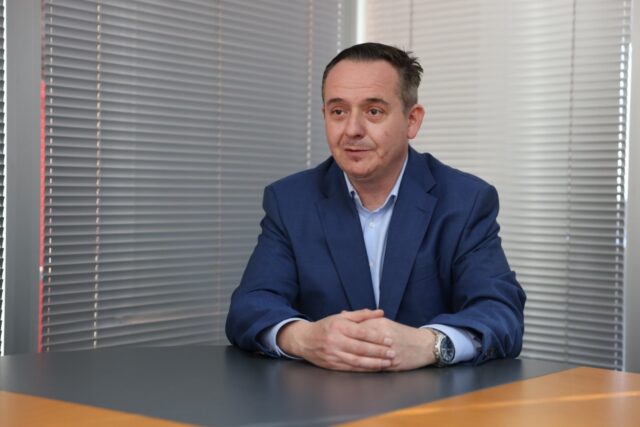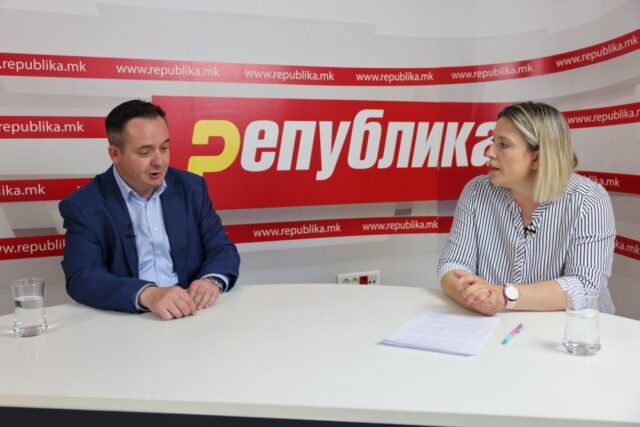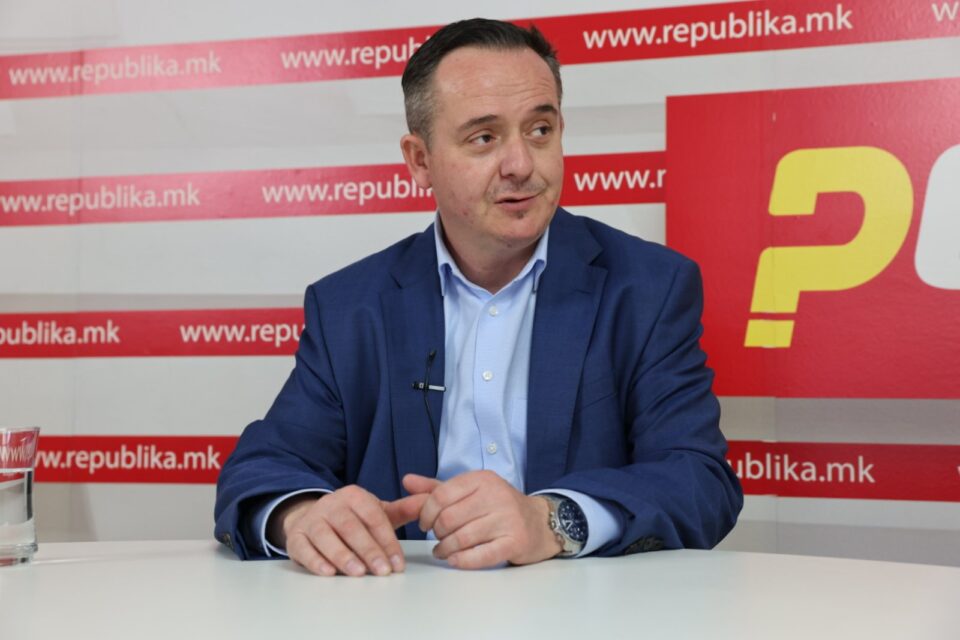May health serve us better given the situation our healthcare is in. Before we were able to make sure that Macedonian healthcare is on its deathbed, but it seems that this time it is in the terminal phase. What’s going on in the world of white coats? There is money in the Fund, but there are no medicines, the staff is leaving, the unions are on strike, our patients are dying.
We talk with Dr. Igor Nikolov from the Health Committee of VMRO-DPMNE about the situation in Macedonian healthcare.
What is the role of the Health Insurance Fund in the healthcare system? What is happening to it right now?
Nikolov: The Health Insurance Fund is public money, the money of the insured, which they pay from each salary. With that money, the state protects public health. The healthcare system consists of three pillars: recipients of services, insurers, providers of services, doctors and someone who pays for those services. It is very important for HIF to function, because they realized with it the rights of the insured, Dr. Nikolov explains why it is very important to ensure adequate and timely protection of the Fund.
What does it mean to leak the personal information of heart disease, cancer, or HIV patients? Who can benefit and how can they benefit from this data?
Nikolov: If the doctor’s secret is breached, human rights are threatened. Since some kind of cyber attack has been taking place for the last two weeks, for which we do not know whether only the data on the payment of the patients’ expenses to the healthcare system or also their diagnoses, i.e. the medical histories for which those expenses were incurred, were breached, the question arises whether the medical secret of the insured is threatened. All this raises many ethical questions. Learning the medical secret of a patient who may be sick with HIV, or may have hepatitis B, and learning the medical history of women, of men, can have many consequences on social life. We don’t know if human rights were threatened and if this data was taken, but with this silence that lasted more than two weeks and with the read explanation in which the director vaguely explained to us that they managed to defeat the hacker, confidence is not created that something is protected.
The two directors need to assume responsibility, to resign immediately, if they cannot resign, the person who brought them to those positions should resign, because it is an unserious approach because there is an incompetent approach and frivolous, arrogant behavior.
The information we receive about the attacks on the system is leaked and opens up the possibility for a lot of speculation. No one knows what exactly is going on, we’re just guessing. Only yesterday, the government adopted a set of measures to improve the security of information systems, which will be implemented in the shortest possible time. How late are we?
Nikolov: Someone’s health depends on urgent medical intervention and we have to wait two weeks for someone to submit a set of protection measures. We have to ask whether they have had a set of measures and why they have not been activated so far. We are continuously bombarded with some kind of cyber attacks, should the measures have been taken after the attack? Should we have mobilized to procure medicines after we have casualties due to the non-availability of those medicines. There must be a serious approach to healthcare, and I don’t see that.

Inpatient treatment patients cannot pay for services. At the time of discharge, they sign statements that they will return to pay when the system is up and running. Who will reimburse the expenses of patients who are not from Skopje? How will the clinics cover their costs until the system is fixed?
Nikolov: That is exactly the question. Who will pay for the return of the patients to Skopje? Will those costs be covered by the Fund? Those additional costs mean that someone has to take responsibility. People were amazed at the statements to be signed.
In the month we learn about rare diseases, a patient with cystic fibrosis died. After a series of shifting of blame between the Prime Minister, the Minister of Health, the Minister of Finance and the Fund, a half-solution was reached. What does Malmed’s decision to issue approval for the import of the “Trikafta” drug means? Will all patients receive the drug? When will the necessary legislative changes be voted on to allow treatment for these patients? Will you vote?
Nikolov: Unfortunately, in the month when all health departments and patients are trying to increase awareness of rare diseases, an unfortunate event happened, which we sympathize with. It is very difficult after an unfortunate event to take corrective measures instead of taking them before. The patient tried to mobilize the public for a long time. He also visited the president of the state, where he was promised that everything would be done to provide the drugs. The questions that arise here are how and from where funds were immediately found, and for two years we heard that those funds were a lot. If someone wanted to solve the problem, funds could have been found much faster, and we would not have to hide behind legal amendments that are not even in sight yet. There are only those announced to the public. The procurement could have been made directly by the government, by a quick procedure. At the moment, it was left to the services of the Pediatric Clinic, again not the government – the clinics, to carry out the procedure, which we hear will be in 2-3 months. If 2-3 months are fast, then what would have happened without the intervention of the government. These patients would have been left to wait for 6-8 months. Unfortunately, the unfortunate event hastened the work and this must not happen again. And so that it doesn’t happen again, all segments of the health system must take responsibility. Health is not a legal procedure. You can’t say I have vacation days about health.
Cancer patients have been buying cytostatics in Serbia for years. A row of humiliation – a row of bureaucracy. But in Serbia, patients also buy antibiotics, diazepam suppositories, and even Vigantol for newborns. Syrups for children are also in short supply, Ventolin for inhalations is not available in larger city pharmacies, so people organize themselves on Facebook and send each other from smaller towns. Chloramphenicol eye ointment is not found. We are no longer talking about expensive drugs for rare diseases and cytostatics.
Nikolov: We got used to dysfunctionality and it becomes a habit. My transplant patients can’t find decortin 5mg, they can’t find any decortin and for 6 months now we have been wondering why someone has to go next door to buy such a cheap drug. To be exposed to additional costs. No one is answering these questions or trying to implement a corrective measure to correct it. There is a shortage of carbamazepine, a whole range of cheap drugs. No one is worried about that and does not take measures. If someone takes it upon himself to run a health system, he must be prepared to implement corrective measures, because, in health care, a small malformation causes big deformations. But those deformations are not virtual, the patients pay for them with their lives.

Recently, in an interview, you said that it is necessary to change the functioning of the Health Insurence Fund and the Health Ministry.
Nikolov: The functionality of HIF is a bureaucratic issue. I would focus more on the healthcare system. The healthcare system needs significant infrastructure improvement. We have a healthcare system in which there is an outdated infrastructure that cannot meet the needs of modern treatment. There has been talking of a clinical center for 20 years, but it still isn’t there. A finished project owned by the Republic of Macedonia, financed by the EBRD, has been discontinued and this has led to an outdated infrastructure that cannot meet the needs. We have a pavilion system in the Clinical Center. If the clinics were under one roof, it would be much easier to carry out health procedures. In addition to this, it is necessary to pay attention to the personnel policy. It will be necessary to keep people in public health. More and more medical professionals are pouring into private healthcare or going abroad for good.
HIF has not changed the positive list for more than 10 years. For the last 5 years, no change has been made to the positive list. The formation of the positive list is subject to a procedure that the last ruling set promised to facilitate so that we get a new positive list, but that didn’t happen either.





Comments are closed for this post.